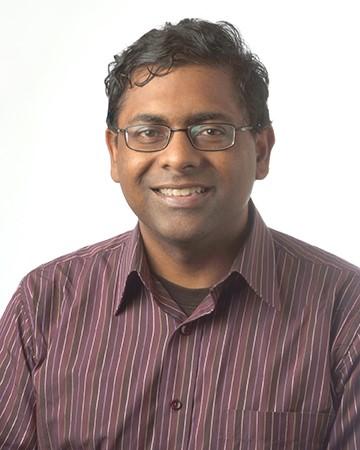“Advances in Integrated Circuits and Systems for Novel Applications”
Dr. Soumyajit Mandal
Thursday, Feb. 14 @ 11:45 am
LAR 310
Abstract
The ongoing Internet of Things (IoT) revolution is driving the need for fundamental innovations in sensing, electronics, and computing that enable scalable, secure, and energy-efficient devices and networks. The talk will begin by briefly describing recent projects in the speaker’s group that aim to realize such innovations through collaborative research at the intersection of integrated circuits (ICs) and systems, signal processing, and sensor physics. In particular, we will describe exciting advances in: i) Energy-efficient computing: low-complexity algorithms and ICs for high-speed analog computing and next-generation wireless transceivers; ii) Precision sensing: sensors and algorithms based on non-invasive spectroscopy and machine learning for authenticating pharmaceutical products and food items; and iii) Biomedical imaging: miniaturized and low-cost approaches, including wearable ultrasound systems for image-guided neuromodulation and the world’s first hand-held magnetic resonance imager (MRI).
The remainder of the talk will focus on an interdisciplinary topic of both scientific and commercial importance, namely highly-stable reference oscillators for precision timing, navigation, and sensing. Quartz crystal oscillators have dominated the timing and frequency control market for decades but are not suitable for monolithic integration with integrated circuits (ICs). Oscillators referenced to micro-electromechanical (MEMS) resonators are emerging alternatives for wearable and mobile IoT devices due to their small form factors, ultra-high quality factor (Q), low power consumption, long-term stability, compatibility with batch processing, high reliability, and wide operating temperature range. During the talk, we will describe digitally-programmable single-chip ICs that enable high-performance MEMS-referenced oscillators. Our chips use programmable building blocks to enable fine-grained control of their overall transfer functions; this allows them to support MEMS resonators with various geometries, transduction scheme, and resonant frequencies. The designs also include advanced features such as i) automatic cancellation of parasitic electrical feedthrough; ii) real-time tracking of the maximum stability point (MSP) in order to adaptively minimize phase noise; iii) ability to realize multi-phase injection-locked oscillator arrays; and iv) ability to connect multiple chips in parallel in order to explore the physics of mode coupling in multimode MEMS resonators. Experimental results from three generations of programmable ICs fabricated in standard CMOS processes will be presented to highlight the proposed concepts.
Biography
Soumyajit Mandal received his B. Tech degree from IIT Kharagpur, India in 2002 with top honors, and his M.S. and Ph.D. degrees from MIT in 2004 and 2009. His doctoral thesis received the MIT Microsystems Technology Laboratories (MTL) Doctoral Dissertation Award. From 2010-2014 he was a Research Scientist at the Schlumberger-Doll research center. He is currently the T. and A. Schroeder Assistant Professor at Case Western Reserve University (CWRU), where he leads the Integrated Circuits and Sensor Physics (ICSP) lab. His research interests include integrated circuits and systems, scientific instrumentation, magnetic resonance (MR) sensors, and biomedical imaging. His projects include bio-inspired (neuromorphic and cytomorphic) integrated circuits, biomedical circuits and systems, structural health monitoring systems, MEMS/NEMS interface circuits, RF energy harvesting, low-power RF systems, low-field and zero-field MR, and other topics related to sensing and computing. He was awarded the Mentor, Learning, and T. Keith Glennan Fellowships, a Nord grant, and an ACES grant by CWRU for innovations in teaching and course development. He has published over 100 papers in international journals and conferences, and has been awarded 18 patents.
